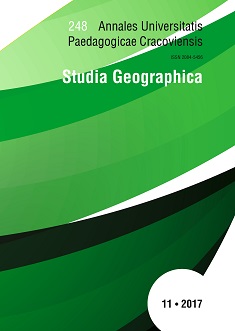Gambling tourism in Macau: The current condition and development perspectives
Keywords:
Macau, gambling tourism, cultural tourismAbstract
Gambling is becoming more and more popular every year. Moreover, since the last 30 years gambling tourism have noted a tremendous growth in the number of participating tourists and received income. Especially rapid increase can be observed in Asia-Pacific Region, namely in Australia, New Zealand, South Korea, Cambodia, Burma, the Philippines, and Singapore. However, there is one place that keeps superiority in the field of the biggest and the best quality of gambling city in the world. This place is Macau. The year 2002 began the process of casinos liberation, and simplification of visa obtaining processes for the Chinese who travel from continental China to Macau and Hong Kong (Individual Visitation Scheme - IVS). That caused a dramatic increase in the number of visitors. Thus, the economy of Macau is based on tourism and gambling. Gambling-focused researches show various positive impacts, especially economic, that gambling tourism brings. This paper, however, is focused on socio-economic approach, and the main aim is to analyse quantitative and spatial development of gambling tourism. Furthermore, in the analysis further development perspectives of gambling in Macau was shown.References
Balsas, C.J. (2013). Gaming anyone? A comparative study of recent urban development trends in Las Vegas and Macau. Cities, 31, 298–307.
Cheng, C.M.B. (1999). Macau: A Cultural Janus. Hong Kong: University Press.
Chung, T. (2009). Valuing heritage in Macau: On contexts and processes of urban conservation. Journal of Current Chinese Affairs, 38(1), 129–160.
Chung, T., Tieben, H. (2009). Macau: ten years after the handover. Journal of Current Chinese Affairs, 38(1), 7–17.
Eadington, W.R. (1995). Casinos: Myths and Realities. Economic Development Review, 1, 51.
Hsieh, P.F., Wang, S.M. (2014). The Impacts of Liberalization in Casino-based Economy – The Case of Macao. International Foundation for Research and Development (IFRD), 316.
Jenkins, C.L. (1982). The effects of scale in tourism projects in developing countries. Annals of Tourism Research, 9(2), 229–249.
McCartney, G., Nadkarni, S. (2003). Heritage versus gaming: Odds on winning a piece of the tourist pie. W: The second DeHaan Tourism Management Conference „Developing Cultural Tourism”, December 16th 2003, Nottingham, UK.
Meng, Z., Wei, Y., Yu, Y. (2011). On life cycle of cultural heritage engineering tourism: A case study of Macau. Systems Engineering Procedia, 1, 351–357.
Rephann, T.J., Dalton, M., Stair, A., Isserman, A. (1997). Casino gambling as an economic development strategy. Tourism Economics, 3(2), 161–183.
Rose, I.N. (1995). Gambling and the Law®: Endless fields of dreams. Journal of Gambling Studies, 11(1), 15–33.
Sheng, L., Tsui, Y. (2009). Casino boom and local politics: The city of Macao. Cities, 26(2), 67–73.
Stanton, J., Aislabie, C. (1992). Up-market integrated resorts in Australia. Annals of Tourism Research, 19(3), 435–449.
Wall, G. (1996). Integrating integrated resorts. Annals of Tourism Research, 23(3), 713–717.
Wong, I.A., Rosenbaum, M.S. (2012). Beyond hardcore gambling: Understanding why mainland Chinese visit casinos in Macau. Journal of Hospitality & Tourism Research, 36(1), 32–51.
Downloads
Published
Issue
Section
License
The submission of a paper to be published is synonymous with an agreement to transfer the copyright free of charge from the author to the publisher. The author also agrees to permit the publisher to publish the paper in printed form, open access online form, digital library form and other digital platforms with which the publisher has or will have a publishing agreement. Furthermore, the author agrees to not limit the number of copies that may be printed or issued by the publisher. In the case of co-authored papers, it is assumed that the corresponding author is authorized to represent the remaining co-authors in this respect. Authors are requested to sign a copyright declaration.

